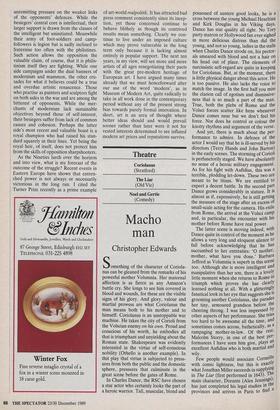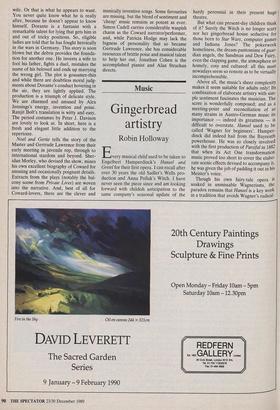Noel and Gertie (Comedy) Coriolanus (Stratford) The Liar (Old Vic)
Theatre
Macho man
Christopher Edwards
Something of the character of Coriola- nus can be gleaned from the remarks of his powerful mother Volumnia. Her maternal affection is as fierce as any Amazon's battle cry. She longs to see him covered in blood and wounds, for these are the visible signs of his glory. And glory, valour and martial prowess are what Coriolanus the man means both to his mother and to himself. Coriolanus is an unstoppable war machine. He takes the city of Corioli from the Volscian enemy on his own. Proud and conscious of his worth, he embodies all that is triumphant and unyielding about the Roman state. Shakespeare was evidently interested in the virtue of self-conscious nobility (Othello is another example). In this play that virtue is subjected to press- ures from both the public and the domestic sphere, pressures that culminate in the great scene before the gates of Rome.
In Charles Dance, the RSC have chosen a star actor who certainly looks the part of a heroic warrior. Tall, muscular, blond and possessed of austere good looks, he is a cross between the young Michael Heseltine and Kirk Douglas in his Viking days. Dance has star quality all right. No Tory party matron or Hollywood fan ever sighed in more delicious distress than did the young, and not so young, ladies in the stalls when Charles Dance strode on, his pector- als smeared with blood and not a hair on his head out of place. The elements of narcissistic self-regard are quite in keeping for Coriolanus. But, at the moment, there is little physical danger about this actor. He is too passive. He also lacks the voice to match the image. In the first half you miss the clarion call of egotism and dismissive- ness that is so much a part of the man. True, both the plebs of Rome and the Volsci forces scatter like hens whenever Dance comes near but we don't feel his force. Nor does he control or colour the knotty rhythms and argument of the verse.
And yet, there is much about the per- formance to admire. In defence of the actor I would say that he is ill-served by his directors (Terry Hands and John Barton) in the early scenes. The storming of Corioli is perfunctorily staged. We have absolutely no sense of a heroic military engagement. As for his fight with Aufidius, this was a terrible, plodding let-down. These two are meant to be titans. We are entitled to expect a decent battle. In the second part Dance grows considerably in stature. It is almost as if, expressively, he is still getting the measure of the stage after an excess of small-scale acting for the camera. His exile from Rome, the arrival at the Volsci camp and, in particular, the encounter with his mother before Rome have real power.
The latter scene is moving indeed, with Dance quite in control of the moment as he allows a very long and eloquent silence to fall before acknowledging that he has succumbed to her entreaties: '0 mother, mother, what have you done.' Barbara Jefford as Volumnia is superb in this scene too. Although she is more intelligent and manipulative than her son, there is a lovely little moment when she returns to Rome in triumph which proves she has clearly learned nothing at all. With a glitteringly fanatical look in her eye that suggests she is grooming another Coriolanus, she parades her tiny, armoured grandson before the cheering throng. I was less impressed .by other aspects of her performance. She tries too hard to be awesome all the time, and sometimes comes across, bathetically, as a rampaging mother-in-law. Of the rest, Malcolm Storry, in one of the best per- formances I have seen him give, plays an. excellent Aufidius who is both martial and wily. Few people would associate Corneille with comic lightness, but this is exac"Y what Jonathan Miller succeeds in supplY2g in The Liar (first performed in 1643): The main character, Dorante (Alex Jennings), has just completed his legal studies in the provinces and arrives in Paris to find wife. Or that is what he appears to want. You never quite know what he is really after, because he doesn't appear to know himself. Dorante is a fantasist with a remarkable talent for lying that gets him in and out of tricky positions. So, eligible ladies are told that he has fought heroically in the wars in Germany. This story is soon blown but the debris provides the founda- tion for another one. He invents a wife to fool his father, fights a duel, mistakes the name of his beloved and ends up marrying the wrong girl. The plot is gossamer-thin and while there are doubtless moral judg- ments about Dorante's conduct hovering in the air, they are lightly applied. The production is a triumph of delicate style. We are charmed and amused by Alex Jennings's energy, invention and poise. Ranjit Bolt's translation is witty and easy. The period costumes by Peter J. Davison are lovely to look at. In short, here is a fresh and elegant little addition to the repertoire.
Noel and Genie tells the story of the Master and Gertrude Lawrence from their early meeting in juvenile rep, through to international stardom and beyond. Sher- idan Morley, who devised the show, mines his own excellent biography of Coward for amusing and occasionally poignant details. Extracts from the plays (notably the bal- cony scene from Private Lives) are woven into the narrative. And, best of all for Coward-lovers, there are the clever and musically inventive songs. Some favourites are missing, but the blend of sentiment and `cheap' music remains as potent as ever. Simon Cadell carries considerable waspish charm as the Coward narrator/performer, and, while Patricia Hodge may lack the bigness of personality that so became Gertrude Lawrence, she has considerable resources of brittle poise and musical talent to help her out. Jonathan Cohen is the accomplished pianist and Alan Strachan directs.











































































































 Previous page
Previous page